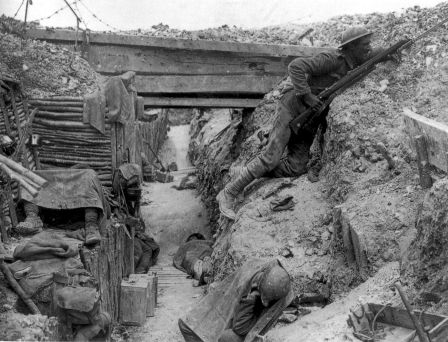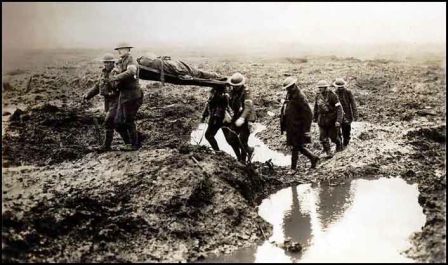The Great War
World War I, commonly known in Europe as the Great War, was truly the greatest war the world had know up to that time. In terms of material cost, manpower, loss of life, number of nations involved, and sheer scope, this war dwarfed everything else the world had experienced. Despite it’s magnitude and clear effect on the development of Europe as we know it today, there is considerable controversy over why it ever happened. It is clear that very little effort was made to prevent it from occurring. What is even more abundantly clear is that, in the beginning, neither side had any concept of the war would become.
World War I is a confusing mass of European power politics and treaties. While the true cause and motivations of the individual nations is in many cases unclear, or at least controversial, there is no doubt that the assassination of the Archduke of the Austro-Hungarian empire and his wife, by a Bosnian Serb extremist, created the spark that ignited the blaze. Through an intricate web of treaties and promises, almost all the great powers in the world of the time became involved, falling into the two baskets of the allied and central powers. The allies, led by Great Britain, France and the Russian Empire, known as the triple Entente, also included Italy, Japan, Belgium, Serbia, Greece, Montenegro, Romania and the Czechoslovak regions. Opposed to the Triple Entente, were the Central powers comprised of Germany, the Austro-Hungarian, and Ottoman empires, as well as the Kingdom of Bulgaria.
While the First World War was predominantly fought in Europe, and not globally like World War II, the empires that were controlled by the warring powers covered a vast majority of the world. In this sense, most of the world was involved in the Great War, if only vicariously through the colonizing nation. Furthermore, with the exception of America early on in the war (America joined the fray in April 1917), all of the global powers were represented in some fashion. In this way, World War I was very much a war that encompassed the world.
Perhaps it could not have been called a World War before America entered the war on the side of the Allies, but with America’s belated entrance in 1917, every major world power became represented. America’s late entrance into the war was a by-product of American sense of independence. Since the War of 1812, America had been free of direct European influence. All interaction with Europe had been voluntary, and the view prevailed that events “over there across the ocean” had little to no effect on America. When European rumblings and smoldering finally ignited into a blaze, sentiment in America was to stay out of it. It was not our responsibility. America simply declared neutrality and continued to trade with both sides. This trade gradually, however, began to favor the allied cause more than the Central powers, and German U-boats began to conduct unrestricted warfare. Now that United States sovereignty was threatened, America decided that action was necessary.
By the time America entered the war, Continental Europe had turned itself into an inferno. Trenches stretched from the North Sea to Switzerland. Campaign after bloody campaign had pushed hundreds of thousands of men to their deaths somewhere in the no man’s land between the trenches. In the five-month Battle of the Somme, which started on July 1 and ended November 25, 1916, the casualties combined casualties topped 1,300,000, and in the first day alone, the British suffered 60,000 casualties, 19,000 of whom were killed. On top of the carnage of battle, disease and horrendous conditions in the trenches also caused problems for the combatants. For the allies, the French suffered significantly during the war endured a horrifying 1.3 million dead and 4.2 million wounded during the war.
Bitterness caused by the appalling mathematics of war, played out in four short years, made recriminations against the central powers, after their defeat (Germany in effect, as the Austro-Hungarian and the Ottoman empire’s ceased to exist), equally as vengeful. The terms placed upon Germany in the Versailles Accords were so punitive that the German economy would never be able to recover under them. Germany was required to pay massive reparations to the allies, which would cripple the economy. On top of this, German territory was significantly reduced and its industrial capacity nearly eliminated. During the Great Depression that followed, the suffering of the average German was tremendous. The German State had to either revive and shake itself free from the debilitating requirements of the Versailles Accords, or sink into obscurity.
In conclusion, the punitive peace of World War 1 was as much the cause of World War II as any other factor. Germany’s inability to live under the Versailles Accords, meant another war must follow; a war even more terrible than the first. The Great War, “the war to end all wars,” fell prey to itself and caused it’s own demise. Far from preventing war, it set the stage for the worst conflict ever known.
Wyatt Fairlead

